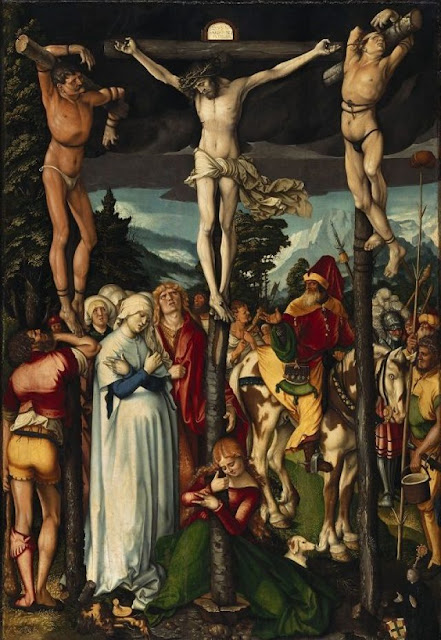Good Friday, that is, the sixth day after the Sabbath,
is held in solemnity because on this day Christ fulfilled the mystery of the cross.
It was for this reason he had come into this world so that, because we had been
struck down on the wood in Adam, we might be healed again through the mystery
of the wood. For by reason of this triumph, human insignificance offers an
annual celebration to Christ throughout the whole world because of the fact
that he deigned to redeem the world by the blood of his passion and to absolve
the sin of the world through the cross, death being conquered.
The substance of his divinity did not undergo the injury
of this cross but only the nature of the humanity he had taken on. For the
passion was of the body; the divinity remained free from injury.
The justification of the Lord's passion is shown
in three parts.
The first reason is so that Christ might be given
as redemption for the guilt of the world and that the ancient enemy might be
caught as if on the fishhook of the cross. Hence, he would vomit out those he
had gulped down, and he would lose the plunder which he had taken, conquered
not by power but by justice, not by domination but by reason.
The second reason is so that the official teaching
of life might be offered to men still to come. For Christ ascended onto the
cross so that a model of suffering and resurrection might be offered to us: of
suffering for the strengthening of patience, of resurrection for the stirring
up of hope. Thus, he might show us two lives in the flesh, one laborious, the
other blessed: the laborious which we ought to tolerate, the blessed for which
we ought to hope.
The third reason for taking up the cross is so
that the pride of the world and its inflated wisdom might fall down,
humiliated, through the seemingly foolish preaching of the cross. So that it
might be evident "that God's foolishness is wiser than human wisdom, and
God's weakness is stronger than human strength" [1 Cor 1:25].
The apostle Paul also teaches that "with the
eyes of your heart enlightened" [Eph 1:18] we ought to know "what is
the breadth and length and height and depth" [Eph 3:18] of the cross. Its
breadth is the transverse bar of the cross on which his hands were extended;
the length, from the transverse bar down to the earth; the height, from the
transverse bar all the way up to his head; and the depth truly that which is
hidden, buried in the ground. Through this sign of the cross the entire life of
the saints is described. For it is said to us:
'Take up your cross and follow me" [Matt 16:24] . For it is then
that the body is crucified, when "whatever in you is earthly is put to
death: fornication, impurity, passion" [Col 3•.5], and so on, and, when
the outer person "is wasting
away" so that the inner "nature might be renewed day by day" [2
Cor 4:16], the suffering is of the cross. And these, indeed, although they are
good works, they are nevertheless still laborious. The reward of these works is
rest, and thus it is said: "Rejoice in hope" [Rom 12:12], so that,
thinking of our future rest, we may perform even our laborious tasks with joy.
The breadth of the cross on the transverse bar of
the wood where the hands are fastened signifies this joy. For the work is
understood through the hands, the joy of working through the length, for
sadness makes shortness. Next, through the height of the cross on which the
head is yoked, there is signified the expectation of celestial retribution
through the justice of our sublime God. And the "faith working through
love" [Gal 5:6] hopes, so that it might be believed that these good works
are to be done not on account of the earthly benefits and temporalities of God,
but rather on account of that which is above. And now truly by the length on
which the whole body is extended, is signified that tolerance so that we might
remain long-suffering. Hence, those who bear up are said to be long-suffering.
Through the depth, however, which is that part of the wood which lies hidden,
fixed in the earth, but thence raises up everything that stands above, are
signified the inscrutable judgments of God by which humans are called by God's
hidden will to the participation of such great grace, "one having one kind
and another a different kind" [1 Cor 7:7].

No comments:
Post a Comment